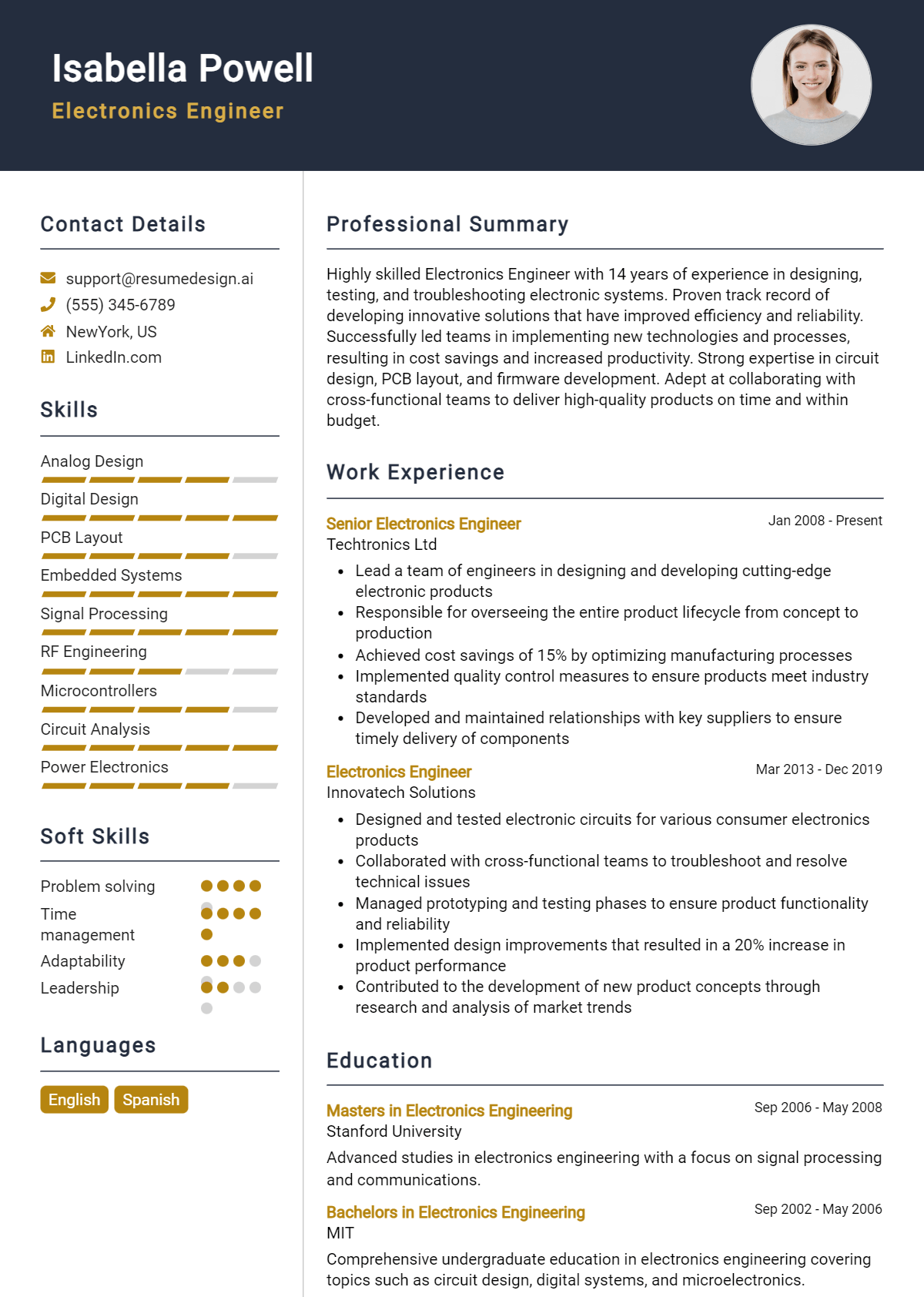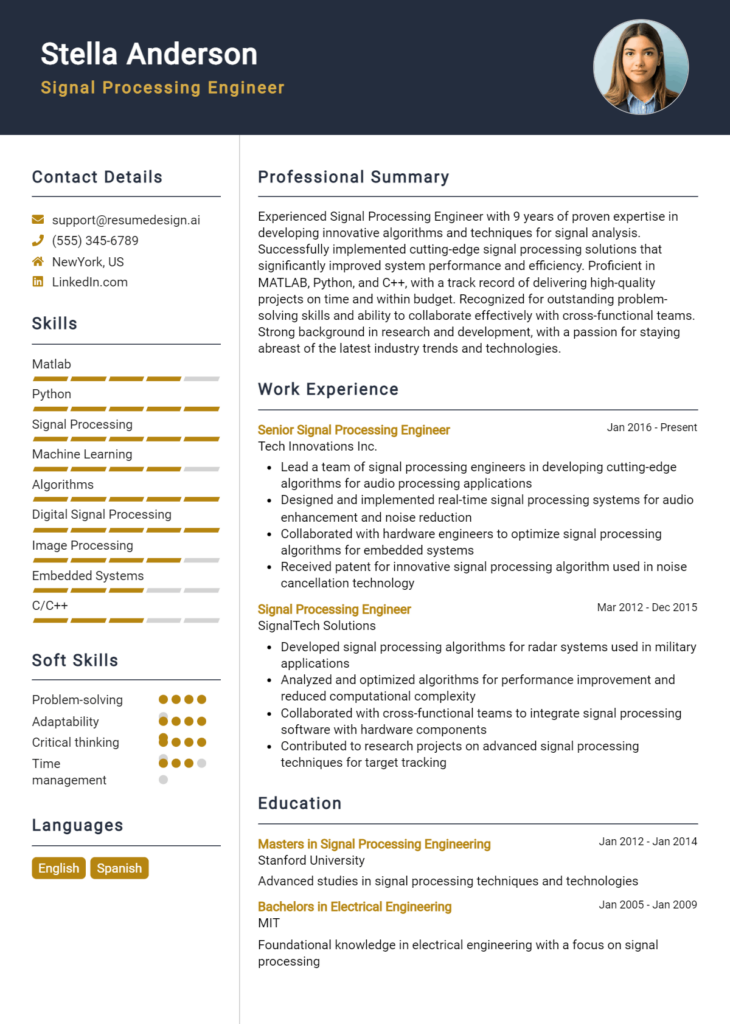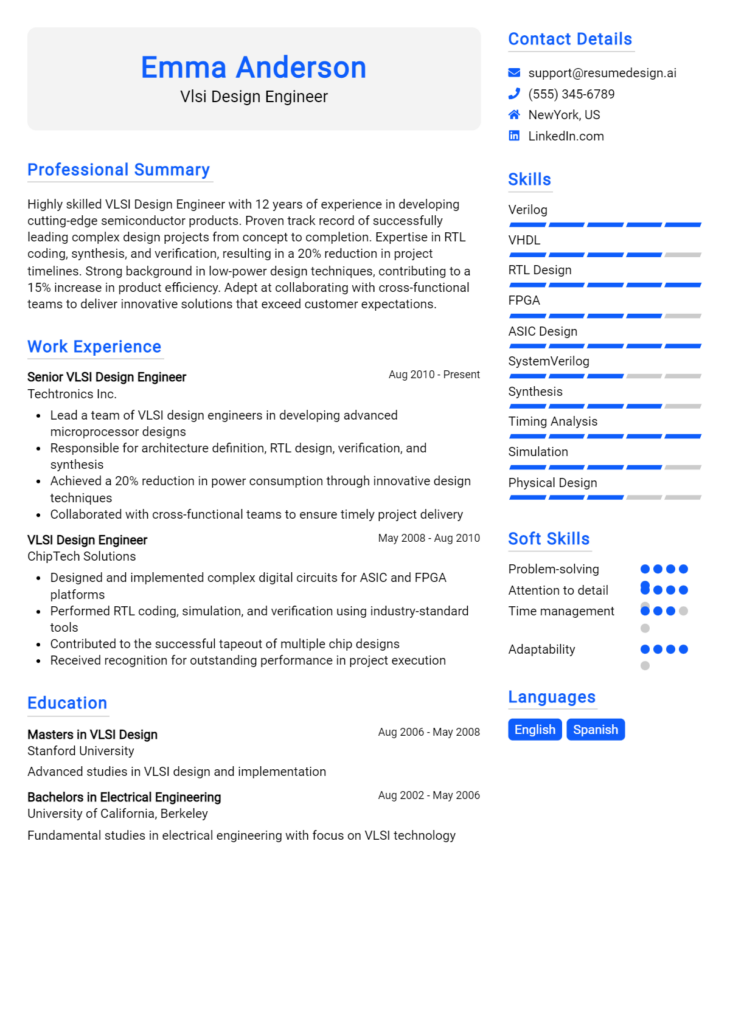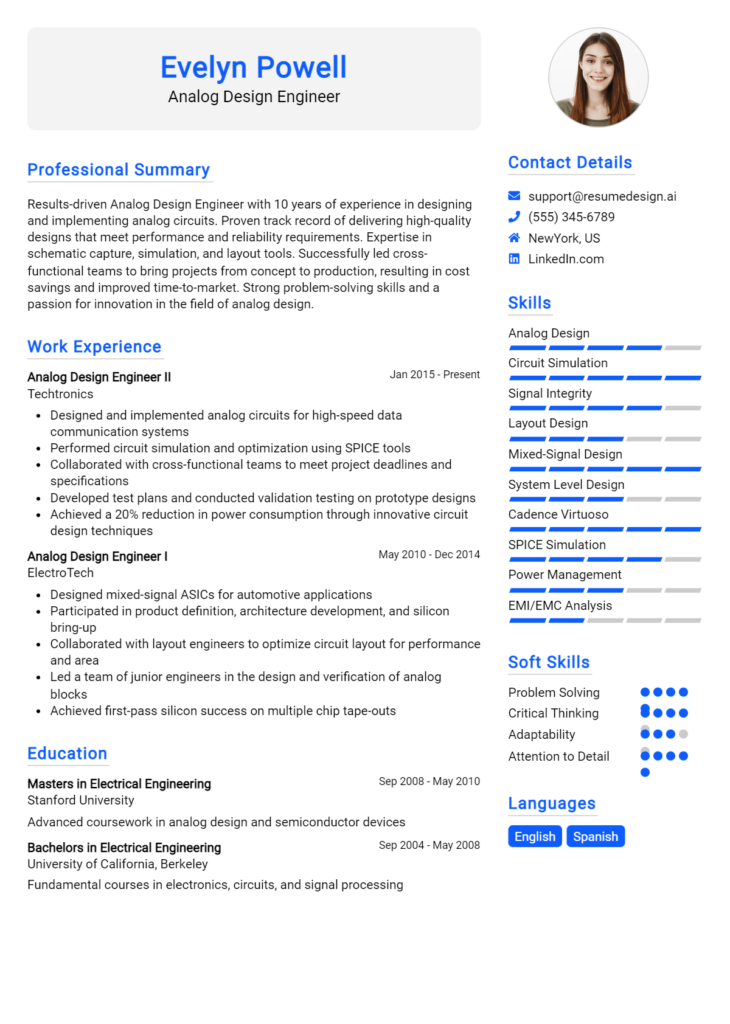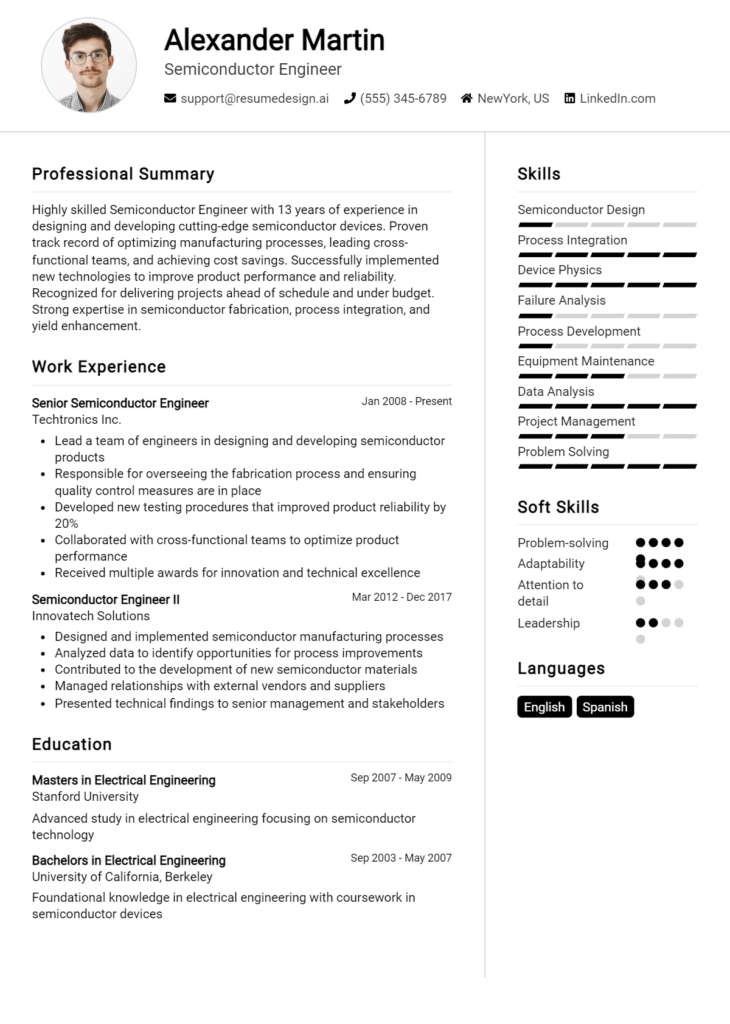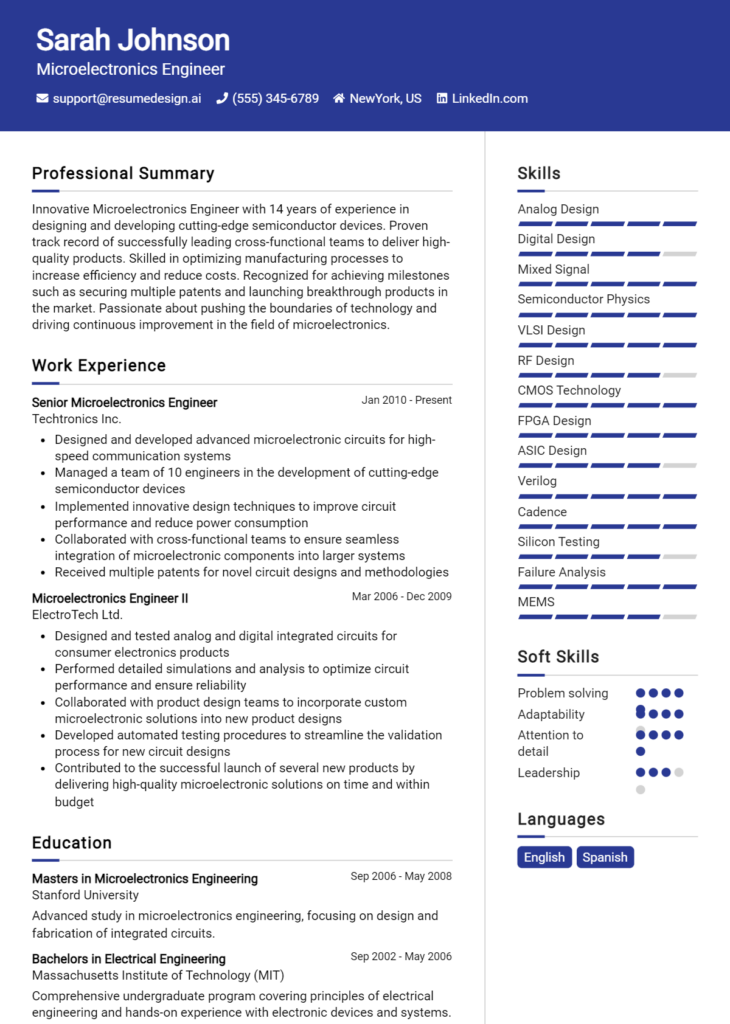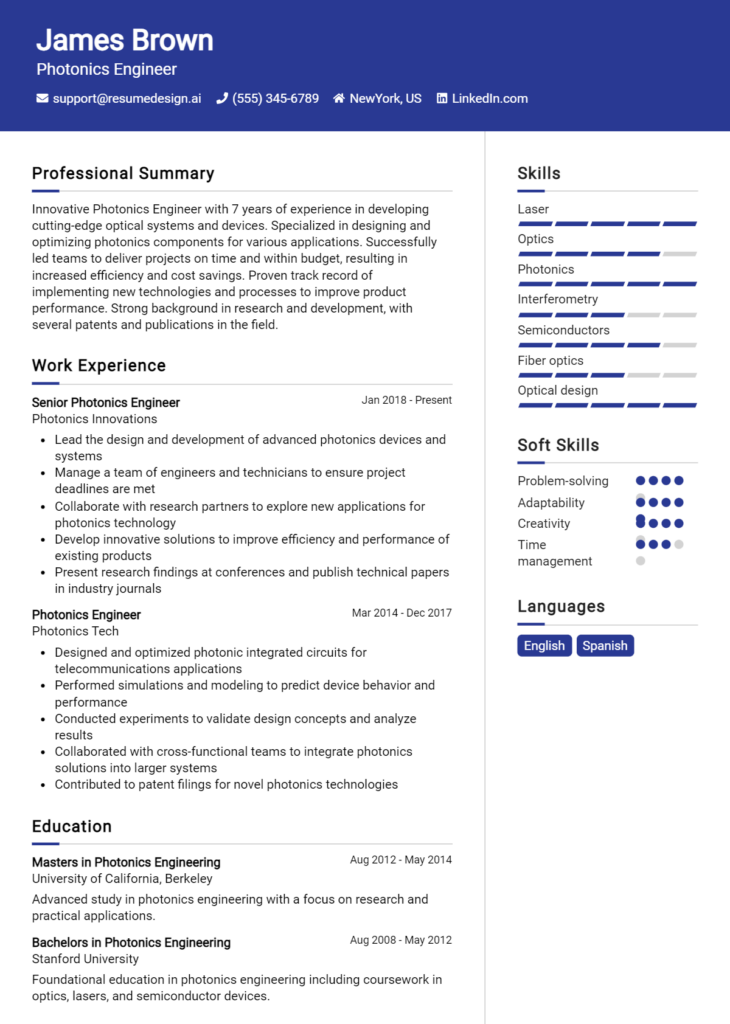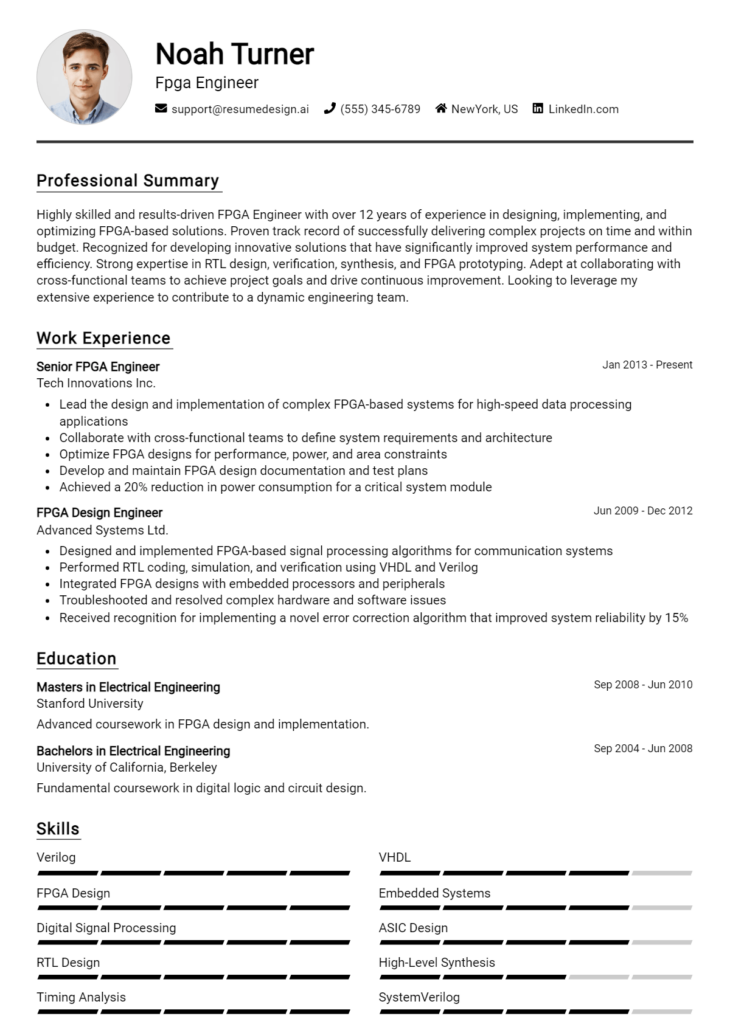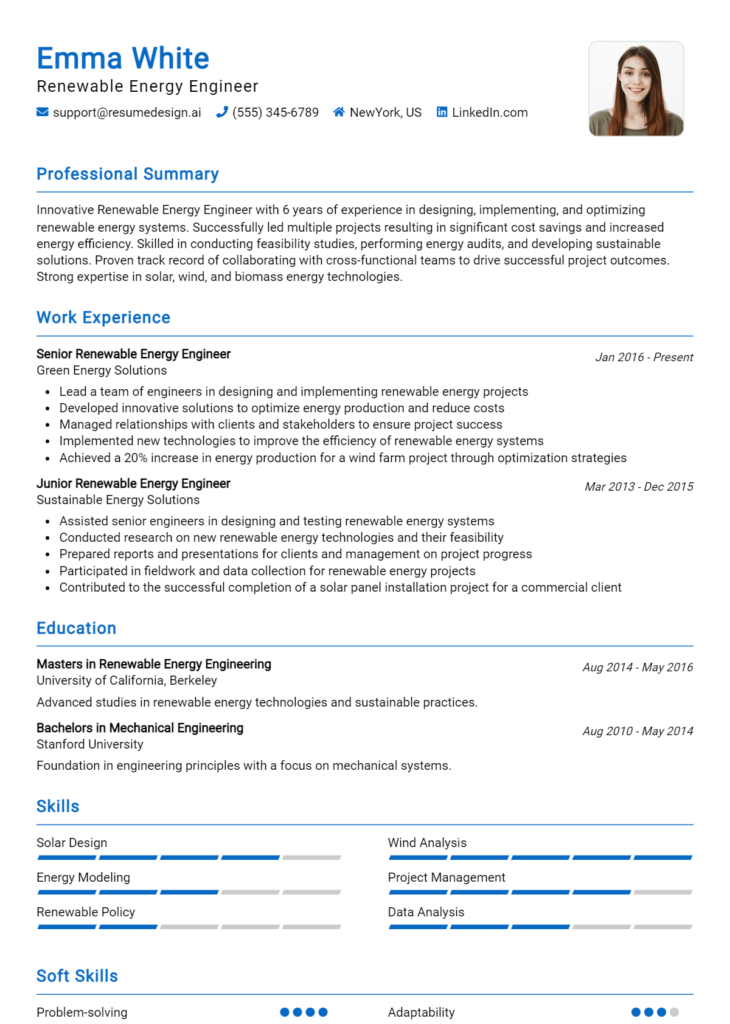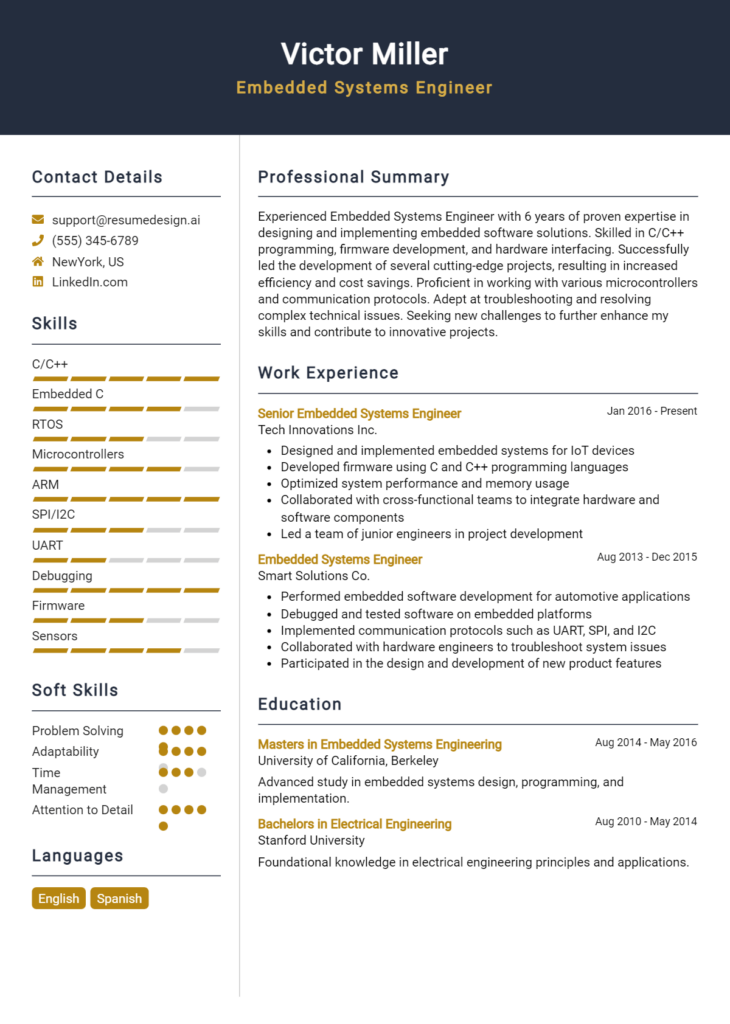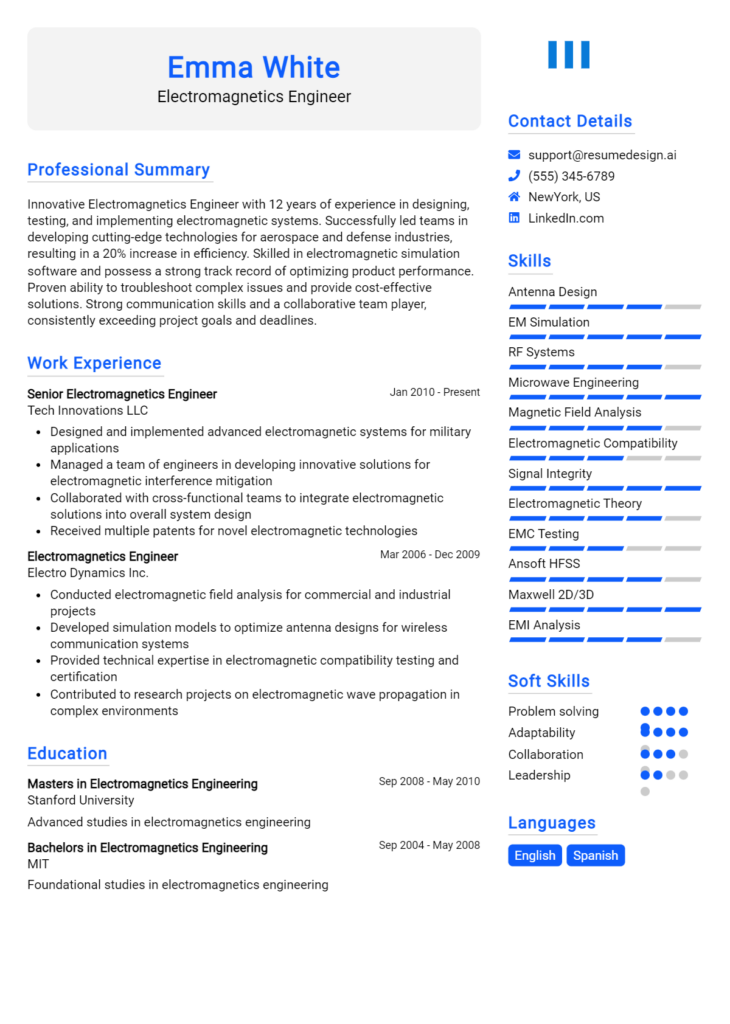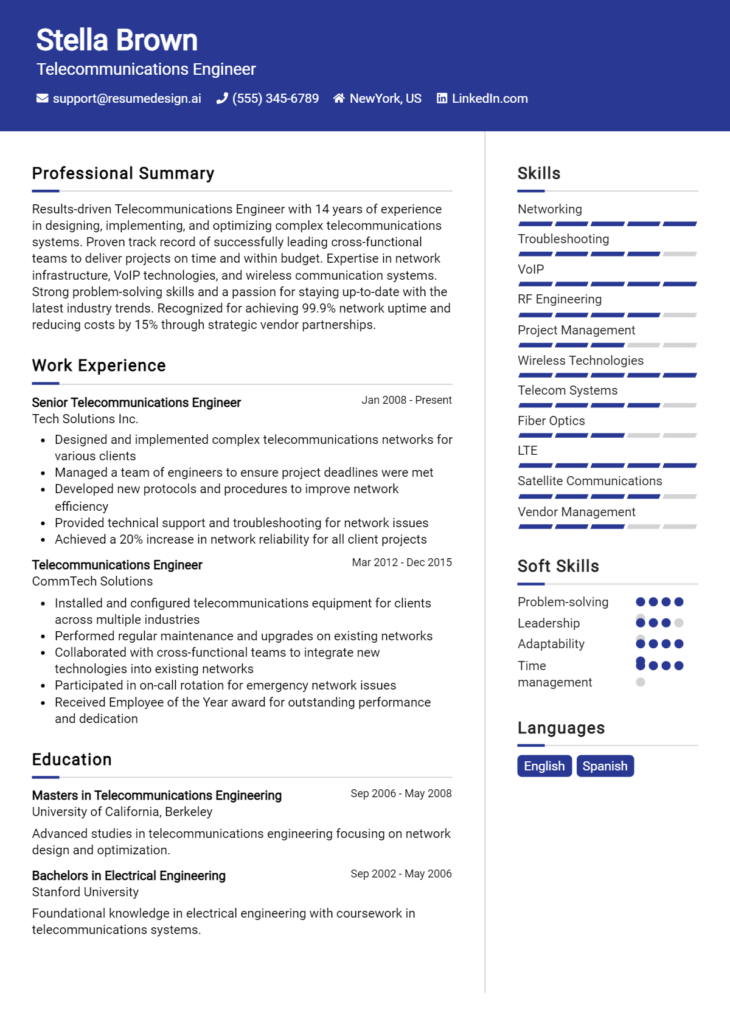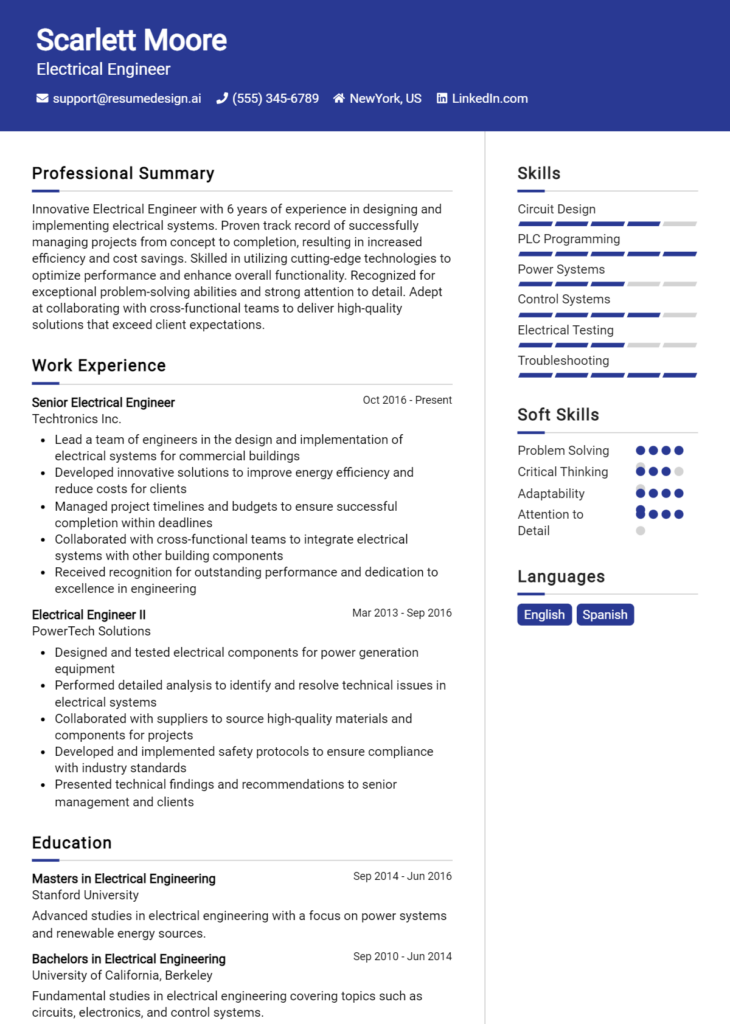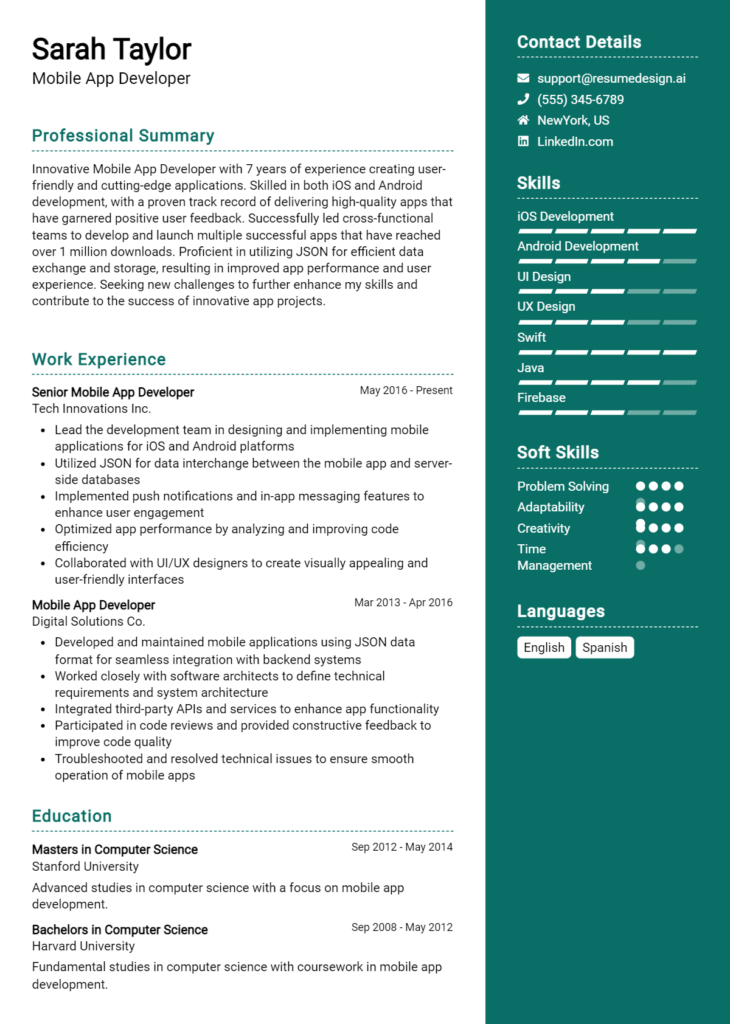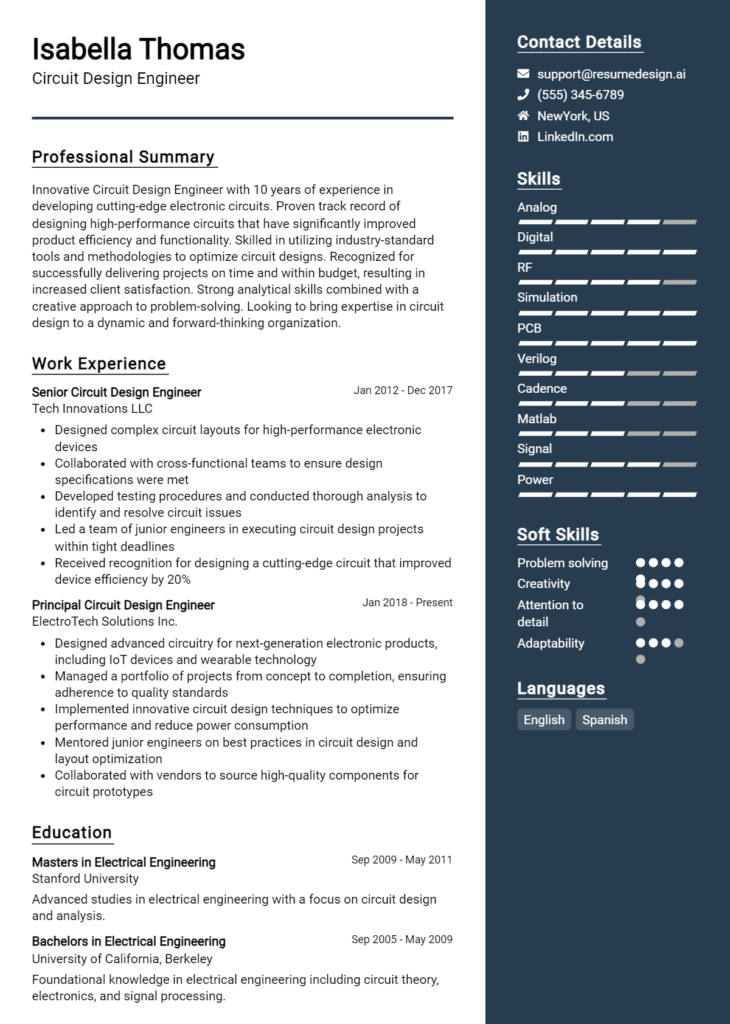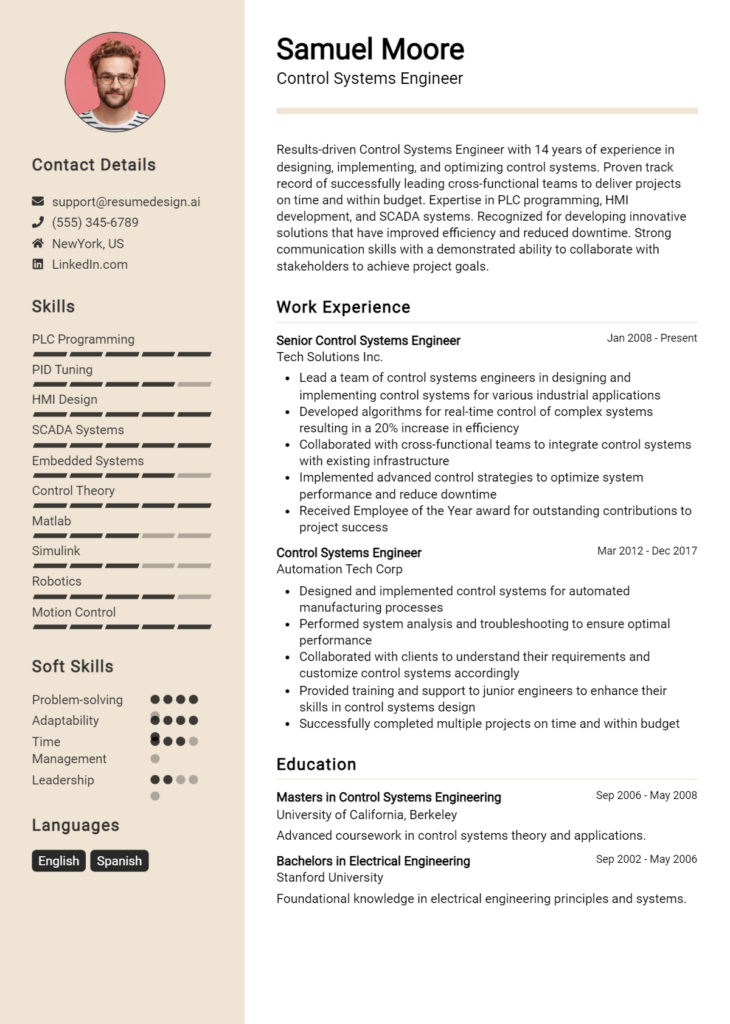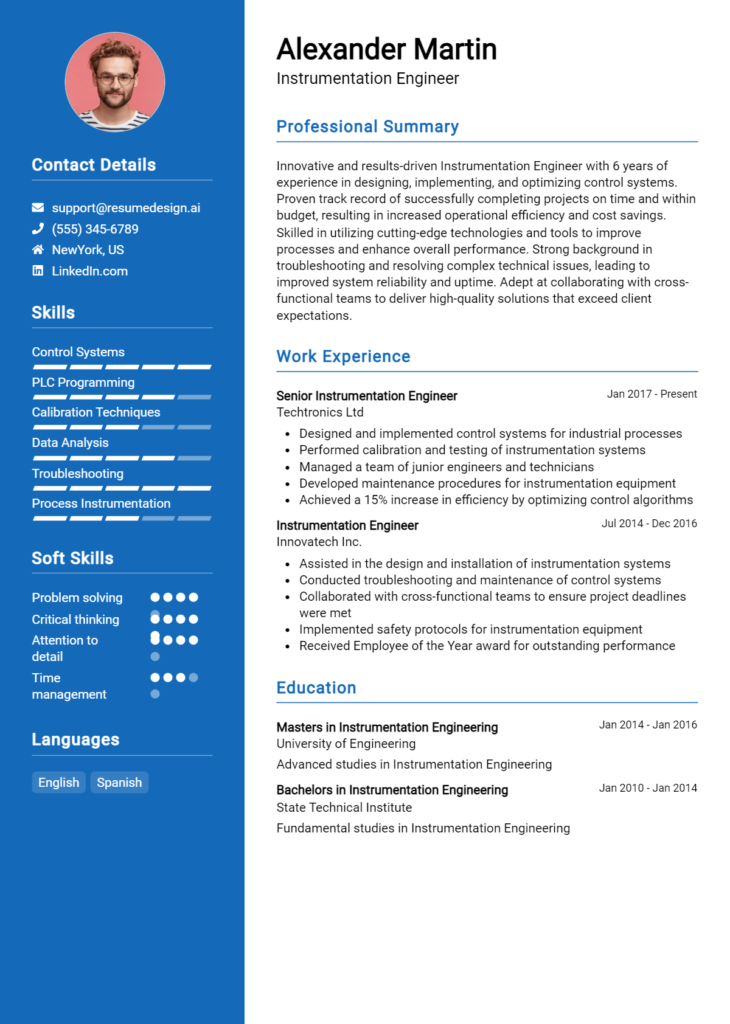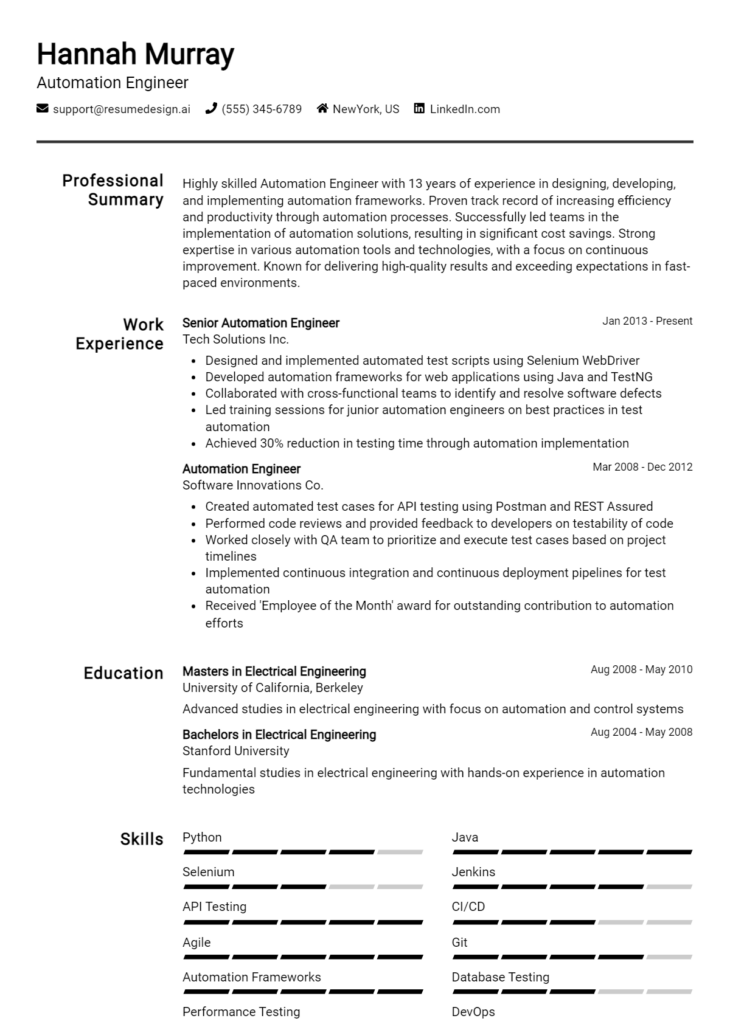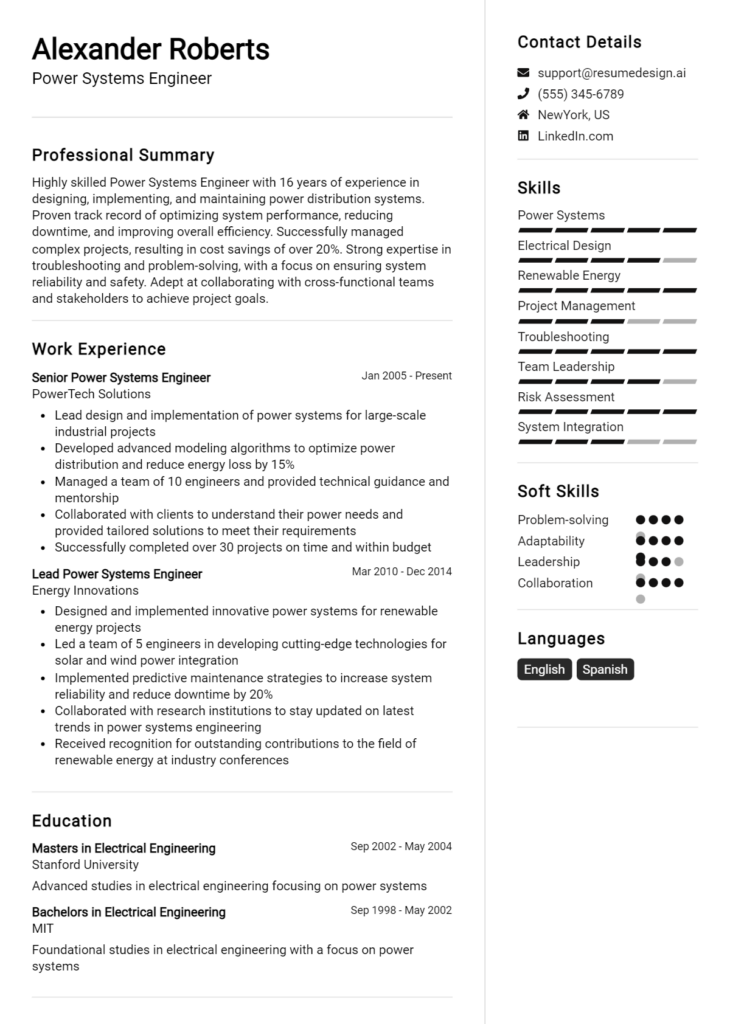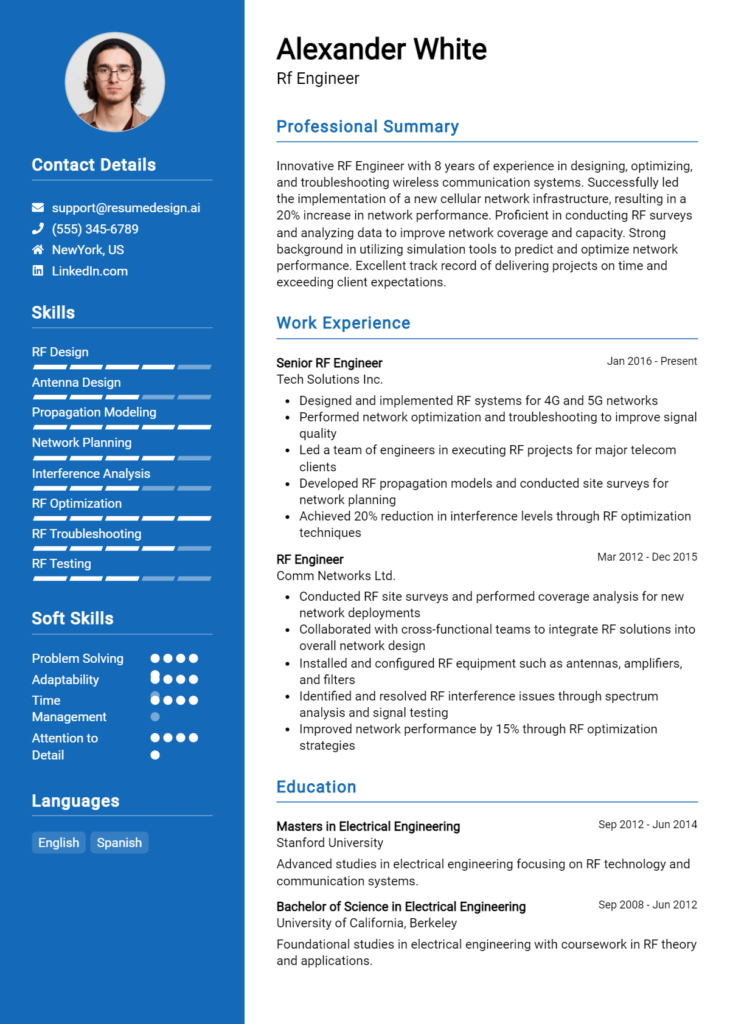Electronics Engineer Core Responsibilities
Electronics Engineers play a crucial role in designing, developing, and testing electronic systems and components. They bridge various departments, collaborating with software engineers, production teams, and quality assurance to ensure seamless integration and functionality. Essential skills include technical expertise in circuit design, operational knowledge of manufacturing processes, and strong problem-solving abilities. These competencies are vital for meeting organizational goals. A well-structured resume can effectively highlight these qualifications, making a candidate stand out in a competitive field.
Common Responsibilities Listed on Electronics Engineer Resume
- Design and develop electronic circuits and systems.
- Conduct feasibility studies and prototype testing.
- Collaborate with cross-functional teams to ensure product integration.
- Analyze and troubleshoot electronic equipment and systems.
- Prepare technical documentation and specifications.
- Implement design improvements based on testing feedback.
- Ensure compliance with industry standards and regulations.
- Manage project timelines and budgets effectively.
- Utilize simulation software for circuit modeling.
- Train and support production staff on new technologies.
- Stay updated on emerging technologies and industry trends.
High-Level Resume Tips for Electronics Engineer Professionals
In the competitive field of electronics engineering, a well-crafted resume serves as a crucial first impression for potential employers. It is not just a document listing your qualifications; it is a marketing tool that showcases your skills, achievements, and suitability for the role. As the first point of contact with hiring managers, your resume needs to effectively communicate your technical expertise and practical experience. This guide will provide practical and actionable resume tips specifically tailored for electronics engineering professionals, ensuring that your application stands out in a crowded job market.
Top Resume Tips for Electronics Engineer Professionals
- Tailor your resume to each job description, emphasizing the skills and experiences that align with the specific requirements of the position.
- Highlight relevant work experience, focusing on projects and roles that demonstrate your capabilities in electronics design, testing, and development.
- Quantify your achievements with specific metrics, such as cost savings, efficiency improvements, or project completion times, to showcase your impact.
- Include industry-specific skills and tools, such as circuit design software, embedded systems, or FPGA programming, to establish your technical proficiency.
- Use clear and concise language, avoiding jargon that may not be familiar to all hiring managers, while still demonstrating your expertise.
- Incorporate keywords from the job posting to improve your visibility to applicant tracking systems (ATS) and demonstrate your fit for the role.
- Showcase your education, certifications, and any relevant training, highlighting specializations that may set you apart from other candidates.
- Include a summary or objective statement at the top of your resume that encapsulates your career goals and what you bring to the table.
- Keep the design professional and easy to read, using consistent formatting, clear headings, and bullet points for better readability.
By implementing these tips, you can significantly enhance your resume and improve your chances of landing a job in the electronics engineering field. A well-structured and tailored resume not only reflects your qualifications but also demonstrates your commitment to the profession, making you a compelling candidate for prospective employers.
Why Resume Headlines & Titles are Important for Electronics Engineer
In the competitive field of electronics engineering, resume headlines and titles play a crucial role in capturing the attention of hiring managers. A strong headline can serve as a powerful first impression, summarizing a candidate's key qualifications in a single, impactful phrase. This succinct summary not only helps to differentiate the applicant from others but also provides a quick insight into their expertise and suitability for the role. An effective resume headline should be concise, relevant, and directly related to the job being applied for, ensuring that it resonates with the specific requirements of the position.
Best Practices for Crafting Resume Headlines for Electronics Engineer
- Keep it concise: Aim for a headline that is no longer than a single sentence.
- Be role-specific: Tailor your headline to align with the specific electronics engineering position you are applying for.
- Highlight key skills: Incorporate essential skills or technologies relevant to the job to showcase your expertise.
- Use action-oriented language: Start with strong action verbs that convey your achievements or capabilities.
- Include measurable accomplishments: If possible, quantify your achievements to provide concrete evidence of your skills.
- Avoid jargon: Use clear and straightforward language to ensure your headline is easily understood.
- Stay professional: Maintain a formal tone that reflects your professionalism and seriousness about the role.
- Revise and tailor: Regularly update your headline to reflect new skills or experiences relevant to different job applications.
Example Resume Headlines for Electronics Engineer
Strong Resume Headlines
Innovative Electronics Engineer with 5+ Years of Experience in Circuit Design and Development
Dedicated Electronics Engineer Specializing in Embedded Systems and IoT Solutions
Results-Driven Electronics Engineer with Proven Track Record in Product Development and Testing
Skilled Electronics Engineer with Expertise in Power Electronics and Renewable Energy Solutions
Weak Resume Headlines
Electronics Engineer Seeking Opportunities
Engineering Professional with Experience
The strong headlines are effective because they clearly communicate specific skills, experiences, and areas of expertise that directly relate to the role of an electronics engineer. They are tailored, impactful, and provide a clear value proposition to potential employers. In contrast, the weak headlines fail to impress due to their vagueness and lack of specificity; they do not effectively convey the candidate's qualifications or unique selling points, making it difficult for hiring managers to see the candidate's fit for the role at a glance.
Writing an Exceptional Electronics Engineer Resume Summary
A resume summary is a critical component for Electronics Engineers looking to make a strong first impression on hiring managers. This brief yet impactful section provides a snapshot of your professional qualifications, showcasing your key skills, relevant experience, and notable accomplishments. A well-crafted summary not only grabs attention but also sets the tone for the rest of your resume, making it essential to tailor it for each specific job application. By being concise and focused, your summary can effectively highlight what makes you a valuable candidate for the position, increasing your chances of being noticed in a competitive job market.
Best Practices for Writing a Electronics Engineer Resume Summary
- Quantify achievements: Use numbers and metrics to demonstrate your impact in previous roles.
- Focus on relevant skills: Highlight technical skills and competencies that align with the job description.
- Tailor for the job: Customize your summary based on the specific requirements and responsibilities outlined in the job posting.
- Be concise: Aim for 2-4 sentences that get straight to the point without unnecessary jargon.
- Use action verbs: Start sentences with strong action verbs to convey a sense of proactivity and results.
- Showcase accomplishments: Mention any awards, projects, or recognitions that underscore your capabilities.
- Maintain professionalism: Use formal language and avoid overly casual phrases to maintain a professional tone.
- Review and revise: Always proofread your summary to eliminate errors and ensure clarity.
Example Electronics Engineer Resume Summaries
Strong Resume Summaries
Results-driven Electronics Engineer with over 5 years of experience in developing innovative electronic systems. Successfully led a team project that reduced production costs by 20%, while improving overall product efficiency by 30%. Proficient in PCB design and firmware development.
Detail-oriented Electronics Engineer with a proven track record in designing and testing electronic circuits. Achieved a 99% success rate in product launches through meticulous testing and quality assurance procedures. Adept in using simulation software and analytical tools to enhance design processes.
Dynamic Electronics Engineer specializing in embedded systems with 7 years of experience in the telecommunications industry. Played a key role in a product redesign that resulted in a 15% increase in market share. Skilled in C/C++ programming and system integration.
Weak Resume Summaries
Electronics Engineer with some experience in electronics. I have worked on various projects and have a good understanding of the field.
I am an Electronics Engineer looking for a new opportunity. I have skills in electronics and have worked on a few projects.
The strong resume summaries are effective because they provide specific details about the candidate's accomplishments, quantify their successes, and directly relate their skills to the job they are applying for. In contrast, the weak summaries lack depth, specificity, and measurable outcomes, making them less compelling and memorable to hiring managers.
Work Experience Section for Electronics Engineer Resume
The work experience section of an Electronics Engineer resume is a critical component that provides potential employers with a detailed understanding of a candidate's technical acumen and practical knowledge in the field. This section not only showcases the candidate's proficiency in designing, testing, and implementing electronic systems but also highlights their ability to lead teams and manage projects effectively. By presenting quantifiable achievements and aligning experiences with industry standards, candidates can demonstrate their value and readiness to contribute to high-quality product development in a competitive market.
Best Practices for Electronics Engineer Work Experience
- Focus on specific technical skills relevant to the position.
- Quantify achievements with metrics, such as project completion times or cost savings.
- Highlight leadership roles and collaborative projects that demonstrate teamwork.
- Tailor the experience to align with industry trends and job requirements.
- Use action verbs to convey impact and initiative.
- Include software and tools proficiency relevant to electronics engineering.
- Showcase problem-solving abilities through specific examples.
- Keep descriptions concise and relevant to the role you are applying for.
Example Work Experiences for Electronics Engineer
Strong Experiences
- Led a cross-functional team of 10 engineers in the successful design and implementation of a new circuit board, reducing production costs by 15% while increasing efficiency by 20%.
- Developed and tested a high-frequency RF amplifier, achieving a 30% improvement in signal integrity, which contributed to a 25% increase in customer satisfaction ratings.
- Managed the full lifecycle of a product development project, from conception to launch, resulting in a 40% increase in market share within the first year.
Weak Experiences
- Worked on various electronics projects.
- Participated in team meetings and discussions about product designs.
- Assisted in testing and troubleshooting electronic devices.
The strong experiences listed demonstrate clear, quantifiable outcomes and showcase the candidate's ability to lead and collaborate effectively. These examples provide specific metrics and results that reflect the candidate's impact on projects, making them more compelling to potential employers. In contrast, the weak experiences lack detail and specificity, failing to convey the candidate's contributions or achievements, which diminishes their overall effectiveness in showcasing expertise.
Education and Certifications Section for Electronics Engineer Resume
The education and certifications section of an Electronics Engineer resume is crucial for showcasing the candidate's academic foundation, specialized training, and commitment to professional development. This section not only outlines the degrees earned and institutions attended but also highlights industry-relevant certifications that validate the candidate’s expertise in electronics engineering. By including pertinent coursework and ongoing learning initiatives, candidates can significantly enhance their credibility, demonstrating their alignment with the job requirements and their preparedness to tackle the challenges of the role.
Best Practices for Electronics Engineer Education and Certifications
- Prioritize relevant degrees such as a Bachelor’s or Master’s in Electrical Engineering or related fields.
- Include industry-recognized certifications like Certified Electronics Technician (CET) or Cisco Certified Network Associate (CCNA).
- Detail advanced coursework that pertains directly to the job description, such as Digital Signal Processing or Circuit Design.
- List any specialized training programs or workshops that enhance technical skills or knowledge.
- Keep the section well-organized and easy to read, using bullet points for clarity.
- Highlight any honors or distinctions received during academic pursuits.
- Regularly update this section to reflect new certifications or educational achievements.
- Consider including relevant online courses or certifications from recognized platforms to show continuous learning.
Example Education and Certifications for Electronics Engineer
Strong Examples
- Bachelor of Science in Electrical Engineering, University of Technology, 2020
- Certified Electronics Technician (CET), National Institute for Certification in Engineering Technologies, 2021
- Advanced Coursework: Digital Systems Design, Microprocessor Architecture, and Control Systems.
- Completed a Project Management Professional (PMP) workshop, enhancing project management skills in engineering contexts.
Weak Examples
- Associate Degree in General Studies, Community College, 2018
- Certification in Basic Computer Skills, Tech Skills Academy, 2019
- Outdated Coursework: Basic Electronics, taken in 2015.
- High School Diploma with no relevant technical emphasis, 2014.
The strong examples are considered effective because they feature degrees and certifications that are directly relevant to electronics engineering and demonstrate a commitment to the field through advanced coursework and specialized training. In contrast, the weak examples lack relevance, as they include general education qualifications and outdated or unrelated certifications that do not align with the requirements of an Electronics Engineer position, ultimately failing to enhance the candidate's profile for the role.
Top Skills & Keywords for Electronics Engineer Resume
In the competitive field of electronics engineering, a well-crafted resume is essential to stand out among numerous candidates. Highlighting the right skills is crucial, as employers seek professionals who not only possess technical expertise but also demonstrate strong interpersonal abilities. Skills serve as a direct reflection of a candidate's qualifications and potential to contribute effectively to a team or project. By showcasing both hard and soft skills, an electronics engineer can present a comprehensive picture of their capabilities, making it easier for hiring managers to assess their fit for the role. Emphasizing relevant skills can significantly enhance the effectiveness of a resume, while detailing work experience provides context to those skills.
Top Hard & Soft Skills for Electronics Engineer
Hard Skills
- Circuit design and analysis
- PCB design and layout
- Signal processing
- Embedded systems programming
- Microcontroller and FPGA development
- Schematic capture tools (e.g., Altium, Eagle)
- Testing and debugging
- Analog and digital electronics
- RF design principles
- Automation and control systems
- VHDL/Verilog coding
- Technical documentation and reporting
- Software proficiency (e.g., MATLAB, LabVIEW)
- Compliance with industry standards (e.g., IPC, ISO)
Soft Skills
- Problem-solving
- Team collaboration
- Effective communication
- Time management
- Critical thinking
- Adaptability
- Attention to detail
- Creativity and innovation
- Project management
- Leadership and mentorship
- Conflict resolution
- Active listening
- Decision-making
- Initiative and proactivity
Stand Out with a Winning Electronics Engineer Cover Letter
I am writing to express my interest in the Electronics Engineer position at [Company Name], as advertised on [where you found the job listing]. With a Bachelor’s degree in Electronics Engineering from [Your University] and over [X years] of hands-on experience in designing, testing, and implementing electronic systems, I am confident in my ability to contribute effectively to your team. My expertise in circuit design, embedded systems, and troubleshooting aligns well with the goals of your organization, making me a strong candidate for this role.
In my previous role at [Previous Company Name], I successfully led a project that involved the development of a new line of consumer electronics. This project not only improved the product's performance by 30% but also reduced production costs by 15%. My proficiency with tools such as MATLAB, Altium Designer, and PCB design software allowed me to streamline the design process, ensuring timely delivery without compromising quality. Additionally, my ability to collaborate with cross-functional teams has honed my communication skills, enabling me to convey complex technical concepts to non-technical stakeholders effectively.
I am particularly impressed with [Company Name]'s commitment to innovation and sustainability in electronics. I am eager to bring my passion for developing cutting-edge technologies and my dedication to environmentally friendly practices to your team. I believe that my background in both traditional and emerging technologies, such as IoT and renewable energy systems, will allow me to contribute to [Company Name]'s mission and help drive future projects to success.
Thank you for considering my application. I look forward to the opportunity to discuss how my skills and experiences align with the needs of your team. I am excited about the possibility of contributing to [Company Name] and am eager to share my insights on how we can push the boundaries of electronics engineering together.
Common Mistakes to Avoid in a Electronics Engineer Resume
When crafting a resume for an Electronics Engineer position, it's crucial to present your qualifications and experiences effectively. Many candidates make common mistakes that can hinder their chances of landing an interview. By avoiding these pitfalls, you can create a clear and impactful resume that highlights your skills and expertise in the field. Here are some mistakes to look out for:
Ignoring Keywords: Failing to include relevant keywords from the job description can lead to your resume being filtered out by Applicant Tracking Systems (ATS). Tailor your resume for each application to ensure you match the employer's requirements.
Overly Technical Language: While it's important to showcase your technical skills, using jargon that may not be understood by all readers can be counterproductive. Strike a balance between technical detail and clarity for a broader audience.
Lack of Specific Achievements: Simply listing job duties without quantifying your achievements can make your resume bland. Use metrics and specific examples to demonstrate your impact, such as "designed a circuit that improved efficiency by 20%."
Poor Formatting: A cluttered or inconsistent format can distract hiring managers from your qualifications. Use clear headings, bullet points, and a professional layout to enhance readability.
Being Too Generic: A one-size-fits-all approach can be detrimental. Make sure to customize your resume for each position, emphasizing the skills and experiences that are most relevant to the specific job you are applying for.
Neglecting Soft Skills: Focusing solely on technical skills can lead to missing out on showcasing your soft skills such as teamwork, communication, and problem-solving, which are increasingly valued in engineering roles.
Long-winded Descriptions: Conciseness is key. Avoid lengthy paragraphs and ensure each statement is direct and relevant. Aim for a resume that is easy to skim, sticking to one or two pages.
Omitting Professional Development: Failing to include relevant certifications, courses, or ongoing education can make your resume seem stale. Highlight any relevant professional development to show your commitment to staying current in the field.
Conclusion
As we explored the dynamic role of an Electronics Engineer, we highlighted the essential skills and qualifications necessary for success in this field. Key points included the importance of a strong foundation in circuit design, proficiency in software tools, and the need for effective problem-solving abilities. We also discussed the growing trends in the industry, such as the integration of IoT and smart technologies, which require engineers to stay updated on the latest advancements.
In conclusion, if you're looking to advance your career as an Electronics Engineer, it's crucial to ensure that your resume accurately reflects your skills and experiences. Take the time to review and refine your resume to stand out to potential employers.
To assist you in this process, we recommend checking out a variety of resources available to enhance your application materials. Explore our resume templates to find a style that suits your professional image. You can also use our resume builder for a user-friendly experience in crafting your resume. Additionally, consider reviewing our resume examples to gain inspiration and insights into what makes a strong application. Don’t forget to complement your resume with a polished cover letter using our cover letter templates.
Take the first step towards elevating your career by reviewing and updating your Electronics Engineer resume today!

